

Animal nutritionist job profile. Animal nutritionists aim to increase and promote the understanding of the effect of diet on the health, wellbeing and productivity of animals.
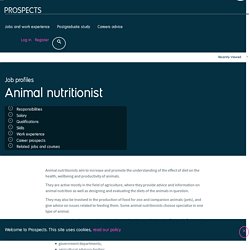
Animal nutritionist: job description. Animal nutritionists are scientists who analyse the nutritional value of animal feeds and provide livestock dietary advice to farming, agricultural and public sector staff.
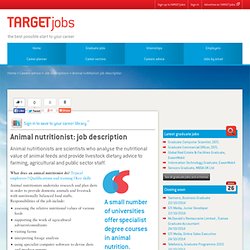
What does an animal nutritionist do? Typical employers | Qualifications and training | Key skills Animal nutritionists undertake research and plan diets in order to provide domestic animals and livestock with nutritionally balanced food stuffs. Responsibilities of the job include: assessing the relative nutritional values of various feeds supporting the work of agricultural advisers/consultants visiting farms interpreting forage analysis using specialist computer software to devise diets and produce reports working with clients to formulate diets that meet their requirements/objectives analysing nutritional disorders maintaining awareness of technical and scientific developments Working hours can be irregular but it is not usually necessary to work during weekends.
Agricultural consultant job profile. Agricultural consultants or advisers offer advice, support and solutions to their clients to ensure their business or enterprise is running as efficiently and effectively as possible.
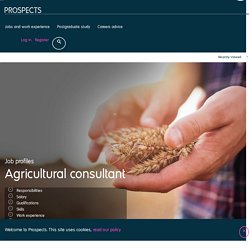
Their clients may be: farmers;growers;landowners;conservation organisations;public bodies;other agricultural businesses in manufacturing and services. Consultants and advisers must be aware of the business and legislative implications of their advice. Types of agricultural consultant Although all consultants provide a problem-solving approach, they usually either consult on technical or business matters. Agricultural consultant: job description. Agricultural consultants are specialist advisers who provide technical, commercial and financial advice and information to farming, agricultural and public sector staff.
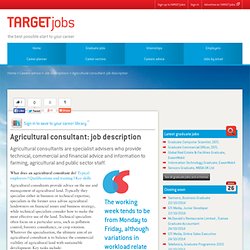
What does an agricultural consultant do? Typical employers | Qualifications and training | Key skills Agricultural consultants provide advice on the use and management of agricultural land. Typically they specialise either in business or technical expertise; specialists in the former area advise agricultural landowners on financial issues and business strategy, while technical specialists consider how to make the most effective use of the land.
Technical specialists often focus on a particular area, such as pollution control, forestry consultancy, or crop rotation. A large proportion of the work is home or office based, while some consultants may also spend time in the laboratory. Opportunities for promotion are into senior consultancy positions and then management positions. Agricultural Consultant Jobs Profile. Introduction This Section of the site details information that you might find useful if you are looking to secure employment or require further details regarding working as an Agricultural Consultant.

This page details the following Information:- Finding Suitable Work as an Agricultural Consultant Working Duties Expected Hours and Environment Working Skills Required Training Requirements Salary Expectations Trade Information Other useful Agricultural Consultant Work Information Finding Suitable Work This website features a volume of Job vacancies advertised on behalf of a number of different employers and specialist recruiters that post vacancies on a regular basis so you can start your search for work right here:- Click here to View all the latest Agricultural Consultant jobs online today We feature many Agricultural Consultant Jobs live online at this site and these posts are updated daily. Working Duties Expected What does the role encounter? Farm manager job profile. Farm managers tend to work in either animal production, dairy or crop production although some do work with all three.
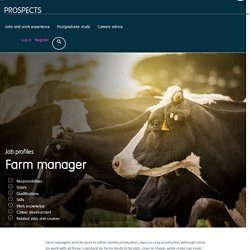
Livestock on farms tends to be pigs, cows or sheep, while crops can cover cereals, oilseed rape, vegetables and salad. The job is varied and includes planning strategies for maximum yield, organising farm administration, working machinery, organising associated businesses and managing staff. Farm managers need to have technical and practical competence, as well as the ability to make sound business decisions.
Farms are typically run by management companies or single-owner farmers. Farm managers must appreciate the need to satisfy regulations set by the Department for Environment, Food and Rural Affairs (DEFRA) for safe, high-quality produce farmed in an environmentally sustainable manner. Agricultural manager: job description. Agricultural managers are responsible for the daily planning, organisation, supervision and administration of activities on farm estates.
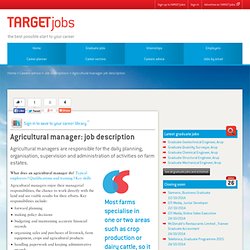
What does an agricultural manager do? Typical employers | Qualifications and training | Key skills Agricultural managers enjoy their managerial responsibilities, the chance to work directly with the land and see visible results for their efforts. Key responsibilities include: Variations in workloads relate to seasonal demands – some unsocial hours may be necessary during busy periods (eg during harvesting or lambing) and managers will be expected to deal with emergencies. Farm manager job information.
Page Content Farm manager HoursVariableStarting salary£20,000 + per year Farm managers work in crop or livestock production, or in mixed farming.
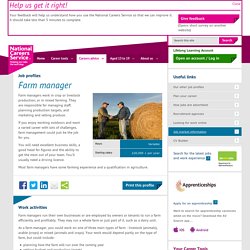
They are responsible for managing staff, planning production targets, and marketing and selling produce. If you enjoy working outdoors and want a varied career with lots of challenges, farm management could just be the job for you. You will need excellent business skills, a good head for figures and the ability to get the most out of your team. Agricultural Business Manager: Job Description & Career Info. Field trials officer job profile.
Field trials officers develop and manage research trials, monitoring the effects of experiments on plants or animals in the field or laboratory.
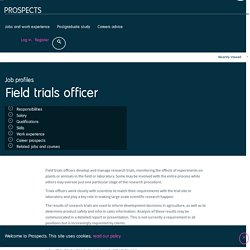
Some may be involved with the entire process while others may oversee just one particular stage of the research procedure. Trials officers work closely with scientists to match their requirements with the trial site or laboratory and play a key role in making large-scale scientific research happen. The results of research trials are used to inform development decisions in agriculture, as well as to determine product safety and inform sales information. Analysis of these results may be communicated in a detailed report or presentation. This is not currently a requirement in all positions but is increasingly requested by clients.
Field trials officer: job description. What does a field trials officer do?
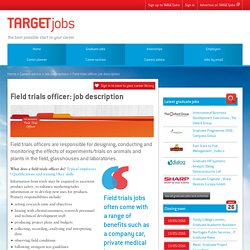
Typical employers | Qualifications and training | Key skills Information from trials may be required to ascertain product safety, to enhance marketing/sales information or to develop new uses for products. Primary responsibilities include: Land-based engineer job profile. Land-based engineering covers three main areas: parts;sales;servicing.
Engineers apply their knowledge of science and technology to machinery and work that is carried out in the environmental and agricultural industries. Businesses in land-based engineering commonly use machinery for agricultural, ground care, horticulture, forestry, construction and sports turf purposes. Land-based engineer: job description. What does a land-based engineer do? Typical employers | Qualifications and training | Key skills Typical responsibilities of the job include: Land-based Engineer Engineering General. Land-based engineers, or agricultural engineers, are employed in agriculture, horticulture, forestry or environmental engineering work. Agricultural engineer job information.
Page Content Agricultural engineer HoursVariableStarting salary£25,000 + per year. Soil scientist job profile. A soil scientist gathers, interprets and evaluates information about the chemistry, biology and physics of soils to inform and influence issues as diverse as: agricultural production;biodiversity;climate change;environmental quality;human health;land remediation. Soil, a natural and renewable resource, is vital to sustaining food production, supporting plant and animal life and providing a foundation for infrastructures across the world. Soil science is an integrated science, covering several scientific disciplines. Therefore, soil scientists can operate in a range of professional areas including: Soil scientist: job description.
Agricultural inspector job information. Page Content. What can I do with an agriculture degree? Agriculture-career-factsheet. Work in Animal Nutrition. By: Margaret Paxton - Updated: 9 Oct 2012| *Discuss Productivity, health and growth are some of the factors that provide animal nutritionists with serious food for thought. What is Nutrition? Nutrition is a process that involves the intake of nutrient materials and their subsequent absorption into the tissues of the animal.
Careers. Thinking about a career in landbased engineering? There has never been a better time to consider working in the landbased engineering sector. With the coming together (in what has become known as the "perfect storm") of climate change, scarce water, ever increasing world populations and associated food shortages, not to mention insufficient energy resources, the need for the broad range of skills embodied in traditional landbased (or agricultural) engineers has never been more evident.
A new brochure Engineering for Agriculture - A World of Opportunity outlining the varied careers opportunities within the sector is now available. Engineers in the landbased sector get involved in the following: ADAS UK Ltd > Home. Biac.co. BSPB. All You Need to Know About Working with Animals. CropLife International. The Crown Estate. Improve Ltd. Science connecting land and people. Plant Breeding Matters. Careers in the Food & Drink Industry.
Environment and countryside.